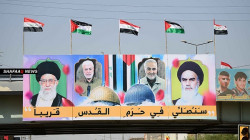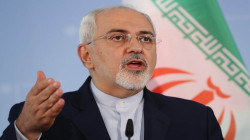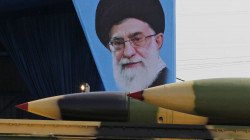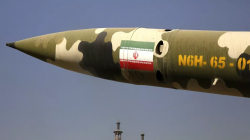Iran-Israel: shadow war that might burst into open
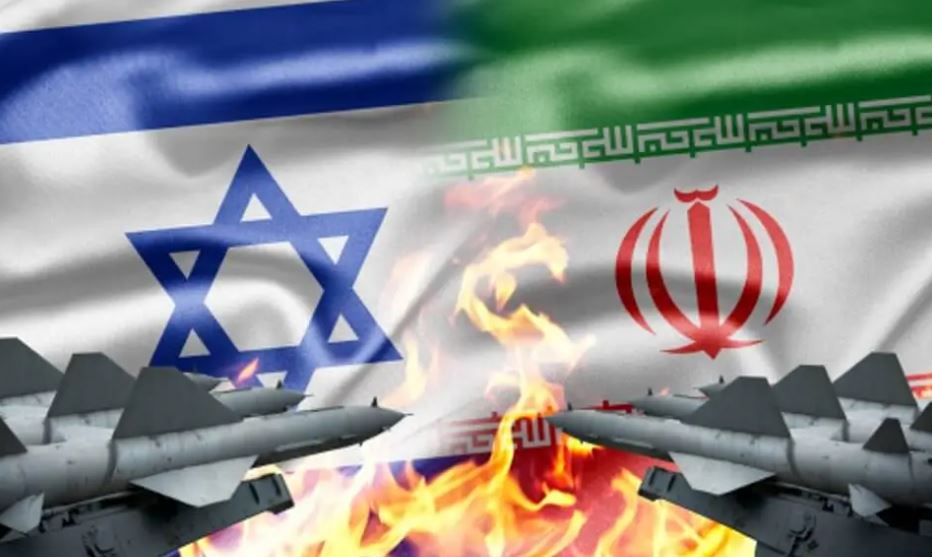
Shafaq News/ The long shadow war between Iran and Israel continues to burst into open in recent days, with the long-standing adversaries exchanging blows both above and under the belt, feeding concerns of a full-blown war that might pull the region, possibly the entire world, into a bloody Armageddon.
Tensions between Israel and Iran have intensified in recent weeks, after the assassination of a top Iranian officer in Tehran last month that it blames on Israel, a number of mysterious deaths of security and scientific personnel inside Iran, airstrikes against Iran-linked targets in Syria, threatening rhetoric from Iranian leaders, and reciprocal cyberattacks.
Fears of a full-blown armed conflict have been fueled by a setback in Iran's recent nuclear talks with the U.S. as President Joe Biden prepares for his first trip to the region, which is expected to include Israel and Saudi Arabia.
The tensions also come on the heels of a heated standoff between Lebanon, Hezbollah, and Israel over a disputed gas field in the Mediterranean; the fate of which remains a point of contention between the two sides despite U.S. mediation.
But the landscape is further obscured by the fact that Washington does not seem eager, at least in public, to push Israel toward war with Iran. Rather, it seems to be more entangled in the developments of the Ukrainian war and its global repercussions on the oil market than in the Israeli pressure toward making a case for military action against Iran.
Israel vs the Octopus
As part of the Israeli pressure, Israeli Defense Minister Benny Gantz called for forming a U.S.-led regional coalition against Iran, citing "the partnership with our U.S. allies, as well as the relations we have built and developed in recent years with countries in the region."
For several days now, Israeli prime minister Naftali Bennett himself has been extolling the virtues of a new Israeli "doctrine" known as "the octopus."
"The time of immunity, when Iran repeatedly struck Israel and sowed terror in the region through its allies while remaining safe, is over," he said on June 7 in the Knesset. "We are no longer playing with the tentacles, with Iran's allies [in Lebanon, Syria, Iraq]: our new tactic is to aim directly at the head," he said in an interview published by The Economist the following day. These interventions have offered Bennett some respite and a rare moment of consensus, at a time when his parliamentary majority is falling apart.
Iran makes tweaks, warns of gale
Iran believes Israel killed two of its scientists by poisoning their food in May, The New York Times cited Iranian officials who preferred to remain anonymous.
The report identified the scientists as Ayoub Entezari, an aeronautical engineer who worked for a military research center, and Kamran Aghamolaei, a geologist.
They are described as top university graduates who were “young, healthy and athletic.” They both fell suddenly ill in late May and continued to grow sicker before ending up in the intensive care units of hospitals in two different cities in Iran.
They both died within days of each other. Iran suspects these are targeted killings by Israel.
Should Iran's suspicions prove to be true, it would be part of a shadow war where Israel targets Iran's military personnel and officials and scientists related to the country's nuclear program, and Iran retaliates by targeting Israelis abroad, particularly in Turkey.
An Iranian foreign ministry spokesman, however, said that any "response" the Islamic Republic would make against Israel would take place inside Israel, "not in a third country."
Earlier this week, a former commander of the Islamic Revolution Guards Corps claimed that Iran is dealing ongoing "blows" to Israel.
“The Zionist regime and its officials know better what blows they have received from the Islamic Republic so far, some of which are even still in progress,” said Mohammad Ali Jafari in an interview with the semi-official Iranian Tasnim news agency.
However, Jafari claimed that many of the IRGC’s operations and attacks on Israel must be kept confidential.
The former IRGC commander said the "blows" have taken place in Israel, the West Bank, the Gaza Strip and even countries across the region, in comments made days after Israel began warning its citizens against traveling to Turkey due to fears of attacks by Iranian agents. There have been a number of Hebrew media reports of attempted kidnapping attempts of Israeli tourists by IRGC agents, but none of them were said to have been successful.
"When the Zionist regime conducts one operation, it is mindful that it would get responses for it several times," he told Tasnim, claiming Israel was using psychological warfare by claiming credit for attacks that it had nothing to do with.
Israeli, Iranian, US Hesitation?
Despite the growing friction, both poles keep a relatively safe distance from the razor-sharp verge of a full-blown confrontation. The micro-attacks from both sides do maintain a hostile discourse and dim red light, but nothing seems to be near a declaration of war, so far.
Earlier this month, Iran's chief nuclear negotiator, Ali Bagheri Kani, told Norway's NRK that Israel "can only attack Iran in its dreams."
"And if they do have such a dream, they will never wake up from it," Iran's state-run IRNA news agency quoted Bagheri Kani.
Echoing the statements of the Revolutionary Guard's top commander Ali Fadawi, the Iranian official rules out the possibility of engaging in a high-caliber military interaction with Israel; a stance the Hebrew government also embraces while reiterating it might respond to any Iranian aggression.
"While it prefers diplomacy in order to deny Iran the possibility of developing nuclear weapons, Israel reserves the right to self-defence and action against Iran to stop its nuclear programme if the international community fails to do so within the relevant time-frame," Bennett's office said following a meeting with the International Atomic Energy Agency (IAEA) chief Rafael Grossi.
In a lower-pitched tone, Former Israeli Military Intelligence chief Tamir Hayman said he believed a return to some form of nuclear deal between Iran and world powers was preferable for Israel to no deal at all.
Speaking to Channel 12 news, Hayman said that "a framework of agreements" was the "least bad" option for Israel at the moment.
The retired general noted that Iran now had capabilities it didn’t previously have in the nuclear field, though it was still some distance away from obtaining a bomb.
Asked about the recent assassination of a senior Iranian military commander in Tehran, attributed to Israel, Hayman, now the managing director of the Institute for National Security Studies. said Iran is being sent a message that Unit 840, a shadowy division within the Islamic Revolutionary Guard Corps' expeditionary Quds Force, poses a danger to the Iranian regime.
Hayman noted that the Iranians and Israelis recognize that the Americans are hesitant about engaging in a large-scale war due to their deep involvement in the Ukrainian conflict that keeps Washington's hands busy.
According to observers, the US State Department's statement that Iran could acquire a nuclear weapon within weeks does not entail hostile remarks against the Iranians, but rather it hints at a framework of emphasis, perhaps specifically for the Israeli side and the high-pitched voices against Iran, on the importance of returning to the option of negotiations.
The U.S. statement literally stated, "Iran could get a nuclear bomb within weeks, so we want a mutual return to the nuclear deal," adding that it would wait for Iran's response, which should abandon "non-substantive" issues, referring to Tehran's demand to remove the Revolutionary Guard from the U.S. terror list.
Furthermore, Washington refused to discuss its hopes for a return to negotiations, insisting that "our steps in self-defense against Iranian escalation are wise, and we are not seeking to escalate tension in the region."
In conclusion, observers noted that the region is teetering on the precipice of a major confrontation, with a small spark causing events to deteriorate and spiral out of control, i.e., any Israeli action within the framework of the "secret war" could be enough to prompt Iran to respond publicly, and vice versa.
The kind of regional influence such a spark would have, who would be drawn into it blindly -whether in Gulf, Iraq, Lebanon, or Syria- and -More importantly- Washington's willingness to rush into a regional conflict -while a more perilous global conflict takes place in Ukraine and threatens to spill across Eastern Europe, if not further afield- remains a subject of mere speculations that only time will make a judgment on it.

